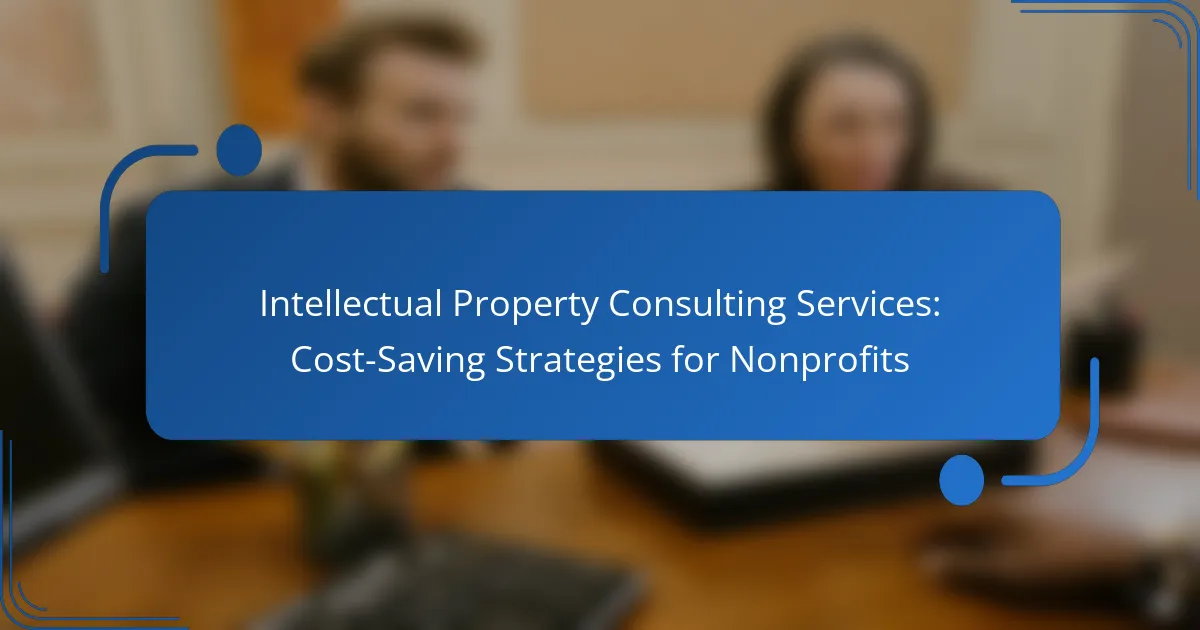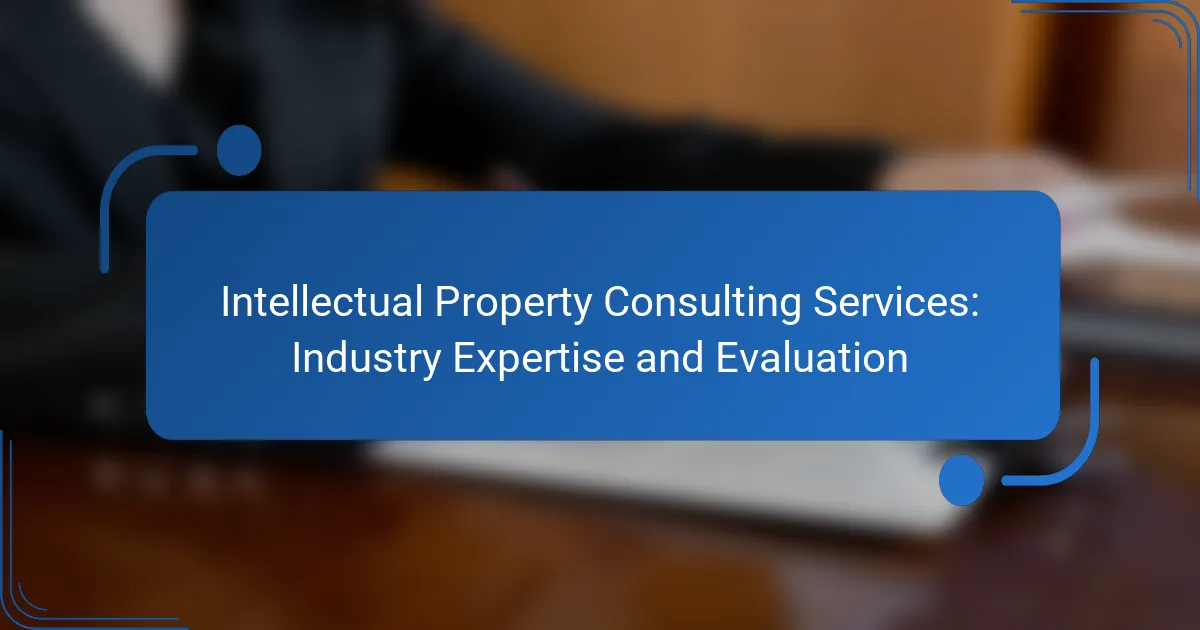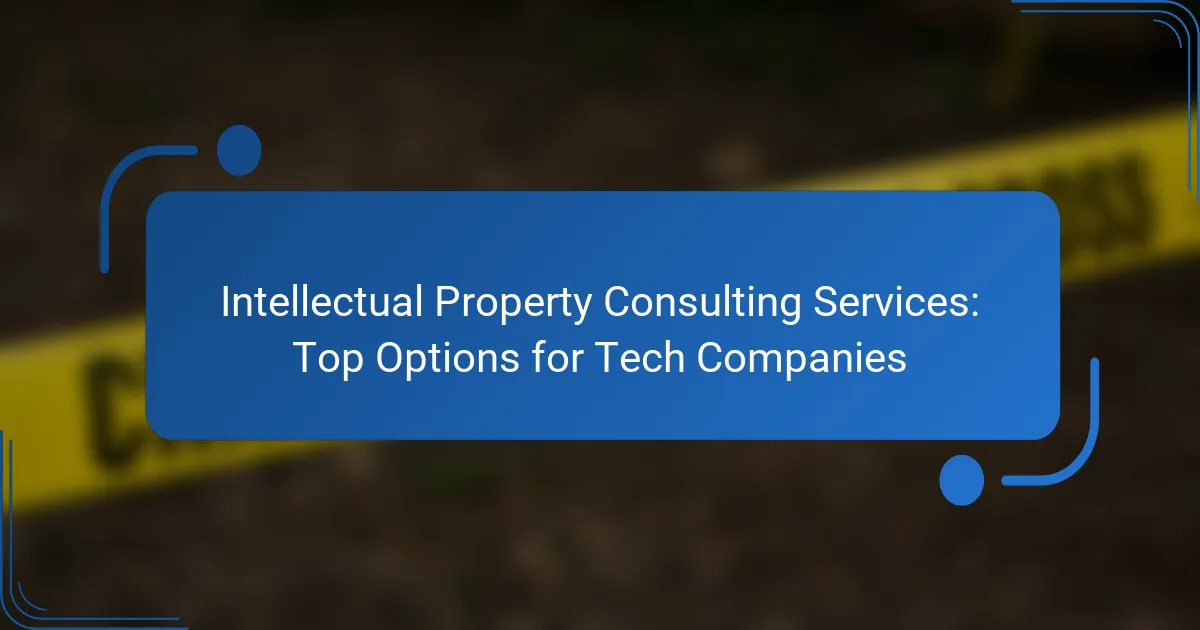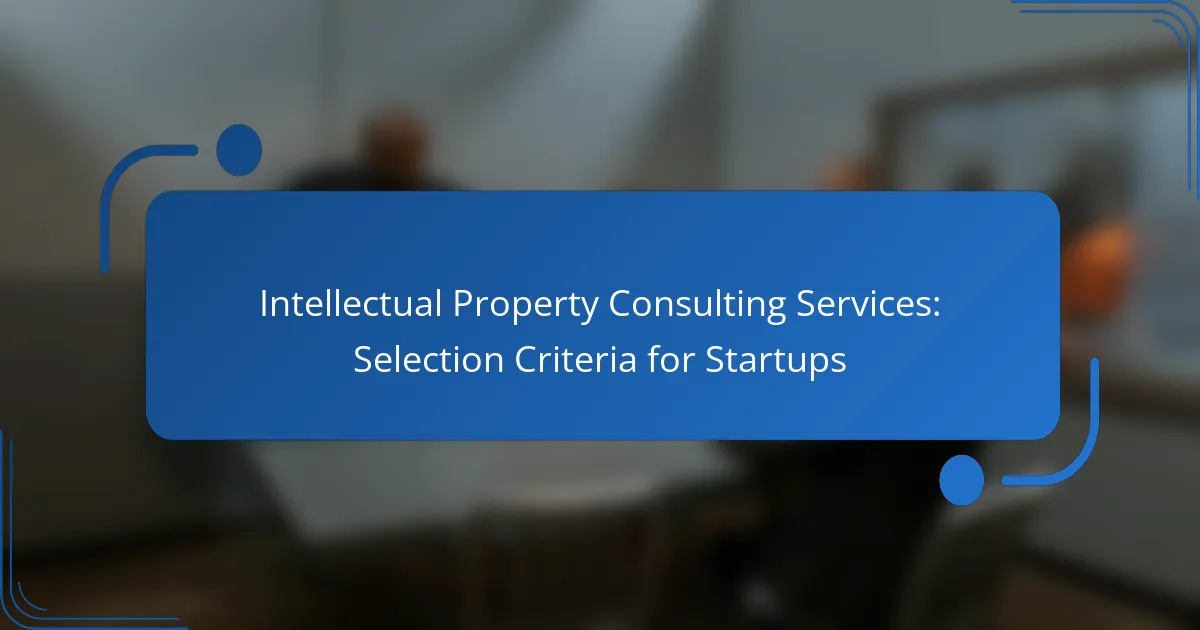Intellectual property consulting services offer nonprofits essential cost-saving strategies to protect their unique ideas and branding while managing their budgets effectively. By leveraging available resources and implementing measures such as trademark registration and copyright protection, nonprofits can safeguard their creative works and avoid potential pitfalls that may lead to lost opportunities. Understanding these strategies is crucial for maximizing impact without straining financial resources.
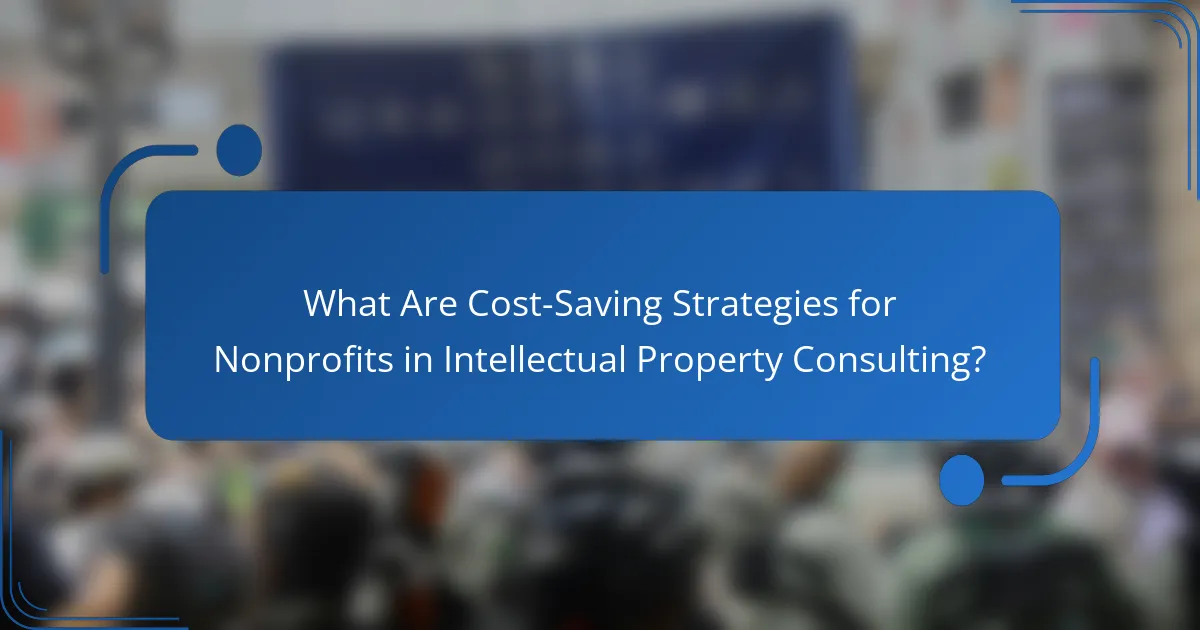
What Are Cost-Saving Strategies for Nonprofits in Intellectual Property Consulting?
Cost-saving strategies for nonprofits in intellectual property consulting focus on maximizing resources while minimizing expenses. By utilizing available services and funding options, nonprofits can effectively manage their intellectual property needs without straining their budgets.
Utilizing Pro Bono Services
Many law firms and individual attorneys offer pro bono services to nonprofits, providing legal assistance at no cost. This can include help with trademark registrations, copyright issues, and patent applications. Nonprofits should actively seek out these opportunities through local bar associations or legal aid organizations.
When engaging pro bono services, ensure that the attorneys have relevant expertise in intellectual property law. Establish clear communication about your needs and the scope of work to avoid misunderstandings.
Leveraging Government Grants
Various government programs provide grants specifically for nonprofits to support their intellectual property initiatives. These grants can help cover legal fees, filing costs, and other related expenses. Research available grants through government websites or nonprofit resource centers to identify suitable options.
Be prepared to demonstrate how your project aligns with the grant’s objectives. This may involve detailing your nonprofit’s mission and the potential impact of your intellectual property efforts on your community.
Collaborating with Law Schools
Partnering with law schools can provide nonprofits access to legal expertise at a reduced cost. Many law schools have clinics where students work on real cases under the supervision of experienced faculty. This collaboration can yield valuable assistance with intellectual property matters while offering students practical experience.
To initiate this collaboration, reach out to local law schools and inquire about their legal clinics. Clearly outline your needs and how students can assist, ensuring that the scope of work is manageable for them.
Implementing Technology Solutions
Technology can streamline many aspects of intellectual property management, reducing the need for extensive legal consultations. Tools like online trademark search databases and copyright registration platforms can save time and money. Explore software solutions that automate tasks such as tracking deadlines and managing documents.
Investing in these technologies can lead to significant long-term savings. However, ensure that the tools you choose are user-friendly and meet your specific needs to avoid unnecessary complications.
Negotiating Fees with Consultants
When hiring intellectual property consultants, don’t hesitate to negotiate fees. Many consultants are willing to adjust their rates, especially for nonprofits, to foster long-term relationships. Be upfront about your budget constraints and explore alternative fee structures, such as flat fees or payment plans.
Before finalizing any agreement, compare multiple consultants to ensure you receive the best value. Consider their experience, reputation, and the specific services they offer to make an informed decision.
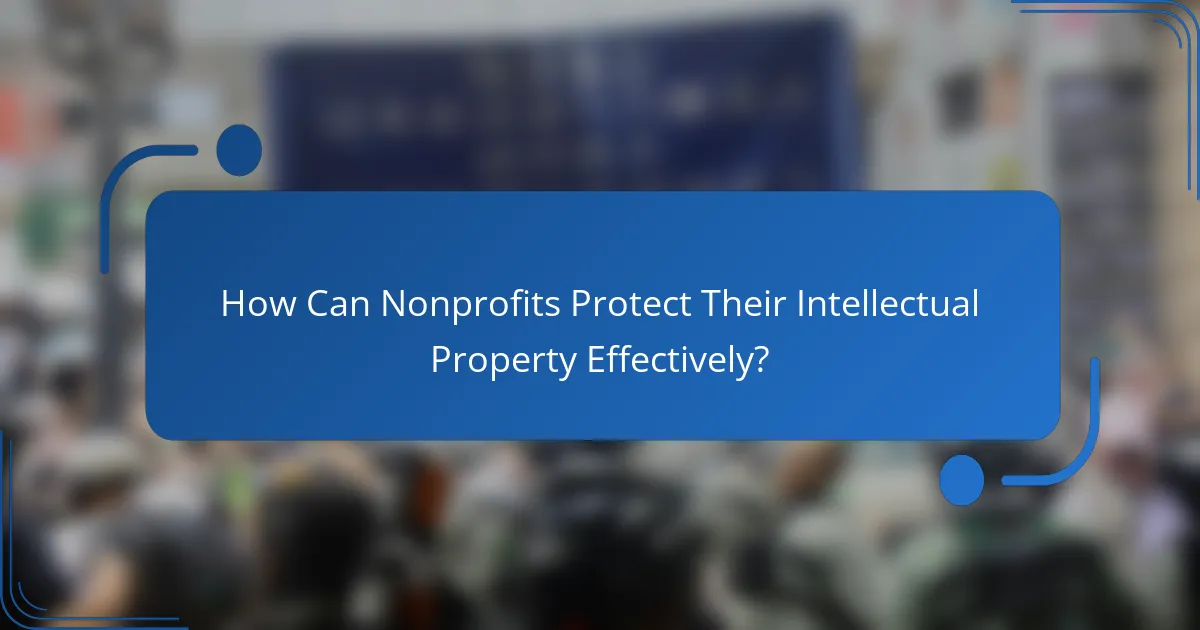
How Can Nonprofits Protect Their Intellectual Property Effectively?
Nonprofits can protect their intellectual property (IP) by implementing strategies such as registering trademarks, securing copyrights, and utilizing non-disclosure agreements. These measures help safeguard their unique ideas, branding, and creative works, ensuring that their contributions are recognized and not misappropriated.
Registering Trademarks
Registering trademarks is a crucial step for nonprofits to protect their brand identity, including logos and slogans. A trademark provides legal ownership and exclusive rights to use specific marks in connection with goods or services, which can prevent others from using similar branding that may confuse the public.
The process typically involves conducting a trademark search to ensure the mark is not already in use, followed by filing an application with the relevant authority, such as the United States Patent and Trademark Office (USPTO) in the U.S. Fees for trademark registration can vary, often ranging from a few hundred to over a thousand dollars, depending on the complexity of the application.
Securing Copyrights
Copyrights protect original works of authorship, such as written content, music, and art, which are essential for nonprofits that create educational materials or promotional content. By securing copyrights, nonprofits can control how their works are used and distributed, deterring unauthorized reproduction.
To obtain copyright protection, a nonprofit must create an original work and can optionally register it with the U.S. Copyright Office or the equivalent body in their country. While registration is not mandatory, it provides additional legal benefits, including the ability to sue for damages in case of infringement.
Utilizing Non-Disclosure Agreements
Non-disclosure agreements (NDAs) are vital for nonprofits when sharing sensitive information with partners, volunteers, or contractors. An NDA legally binds the parties to confidentiality, ensuring that proprietary information, such as project details or donor lists, remains protected.
When drafting an NDA, nonprofits should clearly define what constitutes confidential information, the duration of the agreement, and the obligations of each party. It is advisable to consult with a legal professional to ensure that the NDA is enforceable and tailored to the nonprofit’s specific needs.
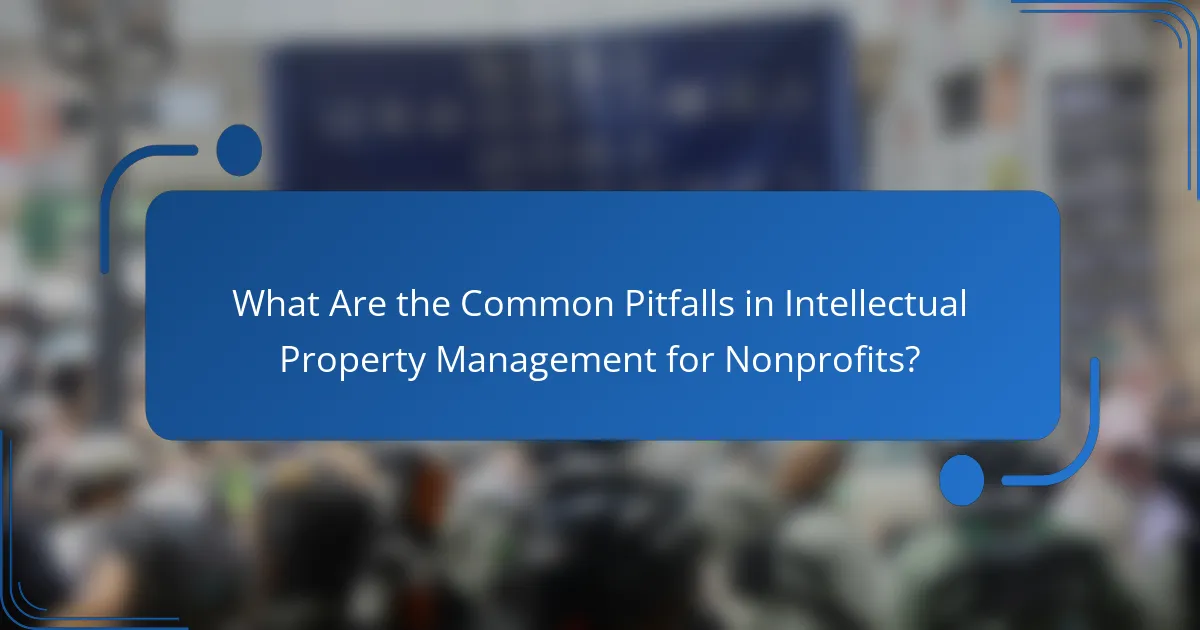
What Are the Common Pitfalls in Intellectual Property Management for Nonprofits?
Nonprofits often face several pitfalls in intellectual property (IP) management that can lead to lost opportunities and increased costs. Understanding these common issues is essential for effective IP strategy and protection.
Neglecting IP Audits
Many nonprofits overlook the importance of conducting regular IP audits, which can identify valuable assets and potential vulnerabilities. An IP audit helps organizations assess their current IP portfolio, ensuring that all trademarks, copyrights, and patents are properly registered and protected.
To avoid this pitfall, nonprofits should schedule audits at least annually. This proactive approach can reveal unprotected assets or expired registrations, allowing for timely action to secure IP rights.
Failing to Educate Staff
Staff education on intellectual property is often insufficient in nonprofits, leading to unintentional infringements or misuse of IP. When employees are unaware of IP policies and best practices, the organization risks losing valuable assets or facing legal challenges.
Implementing regular training sessions and providing accessible resources can significantly enhance staff understanding of IP management. Consider creating a simple guide outlining key IP concepts and procedures to ensure everyone is informed and compliant.
Overlooking International Protections
Nonprofits frequently neglect to consider international IP protections, which can be crucial for organizations operating globally. Without proper international registrations, nonprofits may find their IP vulnerable to infringement in foreign markets.
To mitigate this risk, nonprofits should research the IP laws of countries where they operate or plan to expand. Utilizing international treaties, such as the Madrid Protocol for trademarks, can simplify the process of securing IP rights abroad.
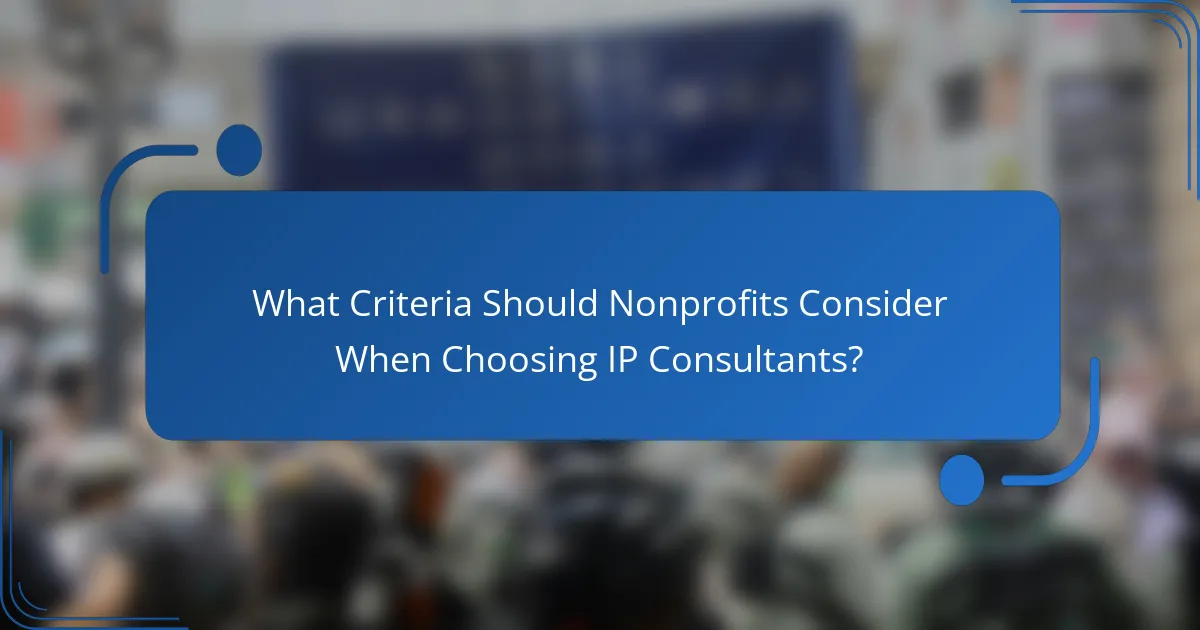
What Criteria Should Nonprofits Consider When Choosing IP Consultants?
Nonprofits should prioritize experience, fee transparency, and a proven track record when selecting intellectual property consultants. These factors ensure that the chosen consultant can effectively meet the unique needs of nonprofit organizations while providing value for their investment.
Experience with Nonprofits
Consultants with a background in nonprofit work understand the specific challenges and limitations these organizations face. They are more likely to offer tailored solutions that align with nonprofit goals, such as budget constraints and mission-driven objectives.
Look for consultants who have successfully worked with similar organizations or sectors. This experience can lead to more effective strategies and a smoother consulting process.
Fee Structure Transparency
Clear and upfront fee structures are essential for nonprofits to manage their budgets effectively. Consultants should provide detailed breakdowns of their costs, including hourly rates, flat fees, or retainer options.
Nonprofits should ask about any additional expenses that may arise during the consulting process. Understanding the total potential costs upfront helps avoid unexpected financial burdens.
Track Record of Success
A consultant’s history of successful IP projects can indicate their capability and reliability. Nonprofits should request case studies or references from previous clients to assess the consultant’s effectiveness in achieving desired outcomes.
Consider consultants who can demonstrate measurable results, such as increased brand protection or successful licensing agreements. This evidence of success can provide confidence in their ability to deliver value to your organization.
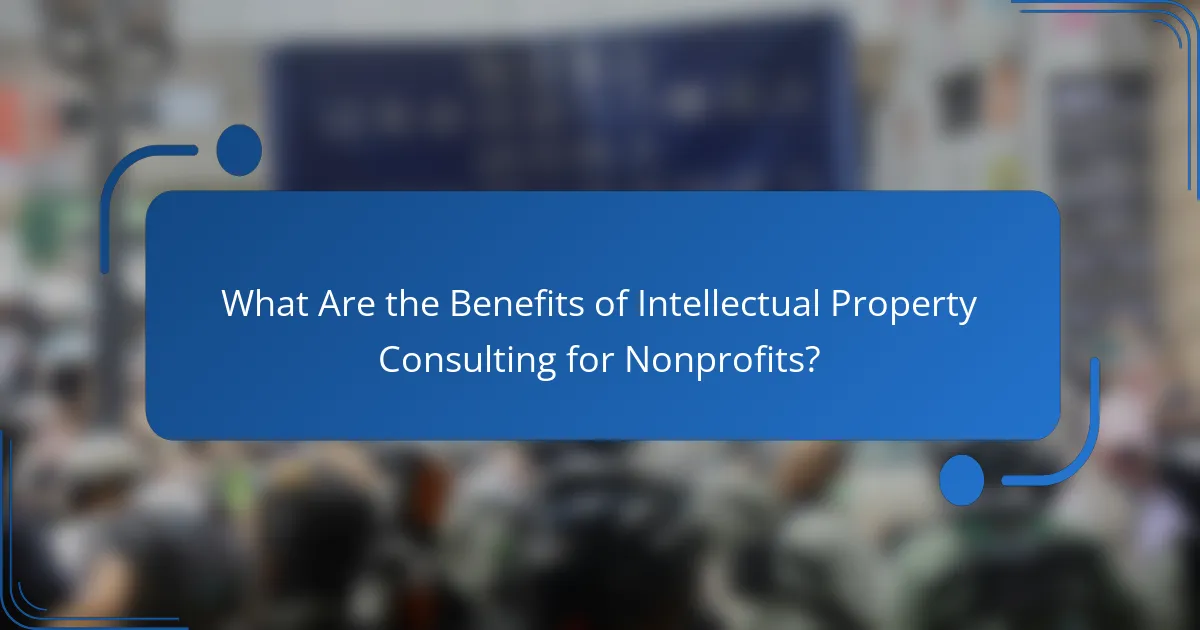
What Are the Benefits of Intellectual Property Consulting for Nonprofits?
Intellectual property consulting offers nonprofits crucial advantages by safeguarding their creative assets and enhancing their operational efficiency. By leveraging expert guidance, nonprofits can protect their brand, increase funding opportunities, and ultimately further their mission.
Enhanced Brand Protection
Protecting a nonprofit’s brand is vital for maintaining credibility and trust. Intellectual property consulting helps organizations register trademarks, ensuring that their logos and names are legally protected from unauthorized use.
Additionally, consultants can assist in developing strategies to monitor and enforce these protections, which can deter infringement and preserve the nonprofit’s reputation. Regular audits of intellectual property can also identify potential vulnerabilities and areas for improvement.
Increased Funding Opportunities
Nonprofits that effectively manage their intellectual property can attract more funding. Funders often look for organizations with strong brand identities and clear ownership of their assets, as this indicates stability and professionalism.
Consultants can help nonprofits create compelling narratives around their intellectual property, showcasing how it aligns with their mission and impacts their community. This can enhance grant applications and appeal to potential donors, leading to increased financial support.
